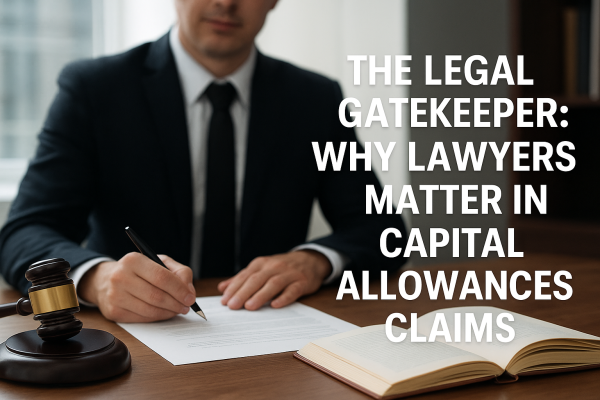
When two parties negotiate a commercial property deal, much of the focus naturally lands on price, leases, due diligence, and title. But hidden within the detail, often overlooked by many, is capital allowances. Whether you secure these reliefs or lose them entirely can come down to how lawyers handle the capital allowances enquiries and contractual drafting.
In commercial deals, good legal work on capital allowances can mean hundreds of thousands in tax relief for your client. Whilst missing the mark may mean losing all capacity for your client to claim.
Here’s why your role as lawyer is indispensable, and how you can ensure capital allowances are not missed.
Why Capital Allowances Must Be Handled in the Legal Phase
1. Standard Enquiries: Section 33 of CPSE
Most commercial property deals use the Commercial Property Standard Enquiries (CPSE) to gather information from the seller. Section 33 is the part dedicated to capital allowances, asking about plant & machinery, prior claims, pooling, and whether the seller will enter into a Section 198 election.
If the seller answers “N/A” or “none known” incorrectly, the buyer may lose valuable entitlement. In reality, the vast majority of CPSE responses relating to capital allowances are generally unhelpful or technically incorrect. Consequently, this can lead to buyers missing out on substantial savings.
A lawyer should ensure those answers are drafted in a way that preserves the buyer’s ability to investigate, negotiate, and protect the capital allowances position.
2. The April 2014 Fixture Rules & Pooling
Since the 2014 change in legislation, the ability to claim capital allowances on passed-on fixtures requires two conditions:
- The seller must have “pooled” the fixtures in their own tax returns.
- The seller and buyer must agree a value that is transferred via a Section 198 election (or by tribunal if there is no agreement).
If those steps are not taken, then HMRC will treat the value of fixtures acquired by the buyer as nil for allowance purposes.
A lawyer should ensure that contract provisions, heads of terms, and schedules secure the pooling evidence and the Section 198 election, and do so within the two-year post-completion window.
3. Contractual Protection & Election Timing
Even if parties agree in the CPSE, the real protection is in the contract. Lawyers should:
- Insert warranties and indemnities around the capital allowance position;
- Include a clause requiring the seller to lodge the Section 198 election on time; and
- Reserve the buyer’s rights to insist on adjustments or steps if the seller fails to provide necessary evidence.
Failing to incorporate these protections may result in lost allowances for both buyer and future owners.
4. Post-Completion Elections & Tribunal Route
Although uncommon, if the parties fail to agree, the buyer can apply to tribunal to fix the apportionment of fixtures. But that route is more expensive, riskier, and less controlled.
Lawyers should aim to lock in the agreement up front, so that post-completion disputes or HMRC challenges are minimised.
Practical Tips for Lawyers to Add Value
- Flag capital allowances from the outset in heads of terms, don’t wait until contract draft.
- Mandate pooling evidence in seller’s disclosures (e.g., prior tax returns showing pools).
- Ensure a Section 198 election window is in the contract, with obligation on the seller.
- Don’t accept blanket “none known” replies in CPSE, push for clarity or qualifier language.
- Engage a capital allowances specialist early to advise on technical questions and quantum.
- Monitor the two-year deadline, if no election is lodged in time, the buyer loses rights.
Working Alongside Lawyers to Secure Client Savings
At CPA Tax, we regularly collaborate with commercial property lawyers to ensure that capital allowances are handled correctly during transactions. These tax reliefs can be lost forever if key sections, such as those within the Commercial Property Standard Enquiries (CPSE) or Section 198 elections, are not properly addressed.
Our team works hand-in-hand with lawyers to review CPSE responses, obtain necessary documentation, and prepare the supporting reports and valuations required to protect your client’s entitlement. By partnering with us early in the transaction, you can confidently ensure that no tax-saving opportunity is overlooked, enhancing both client outcomes and professional value.
If you’re a lawyer advising on commercial property transactions, CPA Tax can provide specialist guidance to help safeguard your client’s position while keeping the process efficient and compliant.
Get in touch:
| Salman Sadiq, Director
Email: salman@cpatax.co.uk |
Babar Khan, Director
Email: bk@cpatax.co.uk |
